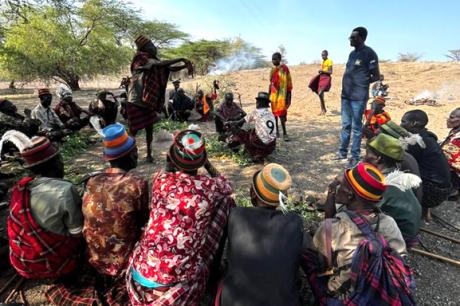
Photo by Raphael Nathaniel (Pixabay)
Published April 10, 2024, last updated on December 3, 2024 under Partnerships
For Taofeeq Togunwa, a student at Nigeria’s University of Ibadan College of Medicine, the fact that children still die from pneumonia in his country feels personal.
Although preventable and treatable, pneumonia remains the world’s deadliest infectious disease for children, killing more than 800,000 children under five each year. Around one in five of those deaths occur in Nigeria where 18 children die from pneumonia every hour. Poor environmental conditions, malnutrition or underlying health factors are among the reasons the disease continues to be deadly across the African continent.
“As an African, you’re not happy seeing the huge burden of child mortality,” says Togunwa, who grew up in southwestern Nigeria. “This is something that shouldn’t be.”
In his final year of medical school, Togunwa is working to change those outcomes. He is part of a team exploring the use of artificial intelligence to speed up pneumonia diagnosis. It’s one of three projects funded as part of a new grant program launched by the Center for Policy Impact in Global Health (CPIGH) at the Duke Global Health Institute.

The $2,000 awards, co-sponsored by the University of Ibadan Medical Students Association, are designed to support Nigerian medical students in coming up with new ways to reduce childhood mortality in the country.
“I believe the solution to a problem usually lies with the people who are closest to it,” says Osondu Ogbuoji, M.B.B.S., ScD, an assistant research professor of global health and deputy director of CPIGH who is overseeing the grant program.
Ogbuoji, a University of Ibadan alumnus who practiced medicine in Nigeria before entering academia, says the grants help create a pipeline of ideas that can influence both clinical practice and research addressing the many factors that drive high childhood mortality rates in low-resource settings.
“Having an opportunity like this injects fresh ideas into our practice, and it’s essential for the future of global health research.,” he says.
One of the projects funded by the program is focusing on parental awareness of sickle cell disease, a blood disorder that affects 2 percent of children in Nigeria, according to the Sickle Cell Foundation of Nigeria. While the disorder can be reversed with bone marrow or stem cell therapies, few people in Nigeria can afford such elaborate measures, says Adeniyi Adesola, a medical student on the project team.
“There’s a cure for sickle cell, but in reality, how many people can afford it?” Adesola asks. “This needs to be addressed. Research shouldn’t be just for [students] to do something, but to contribute to fixing issues like this.”
The final team is assessing the impact of a school-based resilience program on health outcomes. Ayeni Samuel, astudent on the project, says the work was influenced by a rotation in a psychiatric department, where he met children who were afraid to reach out for help.
"Unmet mental health needs can significantly impact the lives of adolescents,” he says. “It's important to recognize that mental health is just as significant as the physical. Investing in their health and well-being ensures a healthier and more prosperous future for society as a whole.”
The program also provides mentorship and training in grant writing and manuscript development, notes Damope Fawole, a research associate with CPIGH who is coordinating the effort. CPIGH will also help teams publish their research when projects are completed in October. The organizers expect to fund another round of projects in the fall.
Like Ogbuoji, Fawole graduated from the University of Ibadan before enrolling in Duke’s Master of Science in Global Health program, and he appreciates the chance to expand opportunities for students to participate in research.
“We want to encourage students to use their skills and interests while we provide the funding to facilitate their work,” he says. ““They’re brilliant individuals and giving them the means to tackle problems can go a long way. It’s a collective effort.
Project Details
The three projects funded in the inaugural year are:
Detection of Pneumonia in Children through Chest Radiographs Using Artificial Intelligence (AI) in a Low-Resource Setting: A Pilot Study
Description: Investigating the effectiveness of artificial intelligence to increase the accuracy of early pneumonia detection in chest radiographs
Team members: Taofeeq Togunwa, Abdulhammed Opeyemi Babatunde
Personal Sickle Cell Phenotype: A Cross-Sectional Study on Awareness, Knowledge, and Attitude Among Parents of Children with Sickle Cell Disease in Ibadan, Oyo State, Nigeria
Description: Assessing sickle cell disease in children and disorder awareness in their parents
Team members: Adeniyi Abraham Adesola, Joshua Simpa Lawal, David Mobolaji Akoki, Abigail Olawunmi Oyedokun, Oluwatomisin Esther Agboola, Anuoluwapo Agnes Babawale
The Effect of a School-Based Resilience Training Program on the Psycho-Social Health Outcomes of Vulnerable Adolescents in Nigeria
Description: Evaluating a resilience program’s impact on health outcomes for adolescents
Team members: Akinrinde Deborah, Adegbite Adedapo, Akande Damilola, Ayeni Samuel


